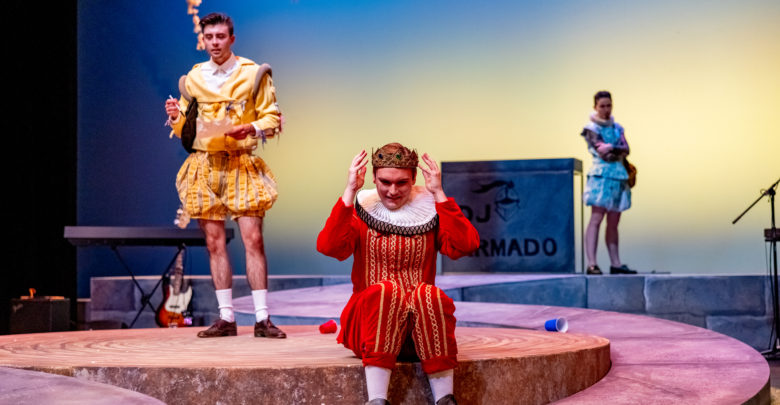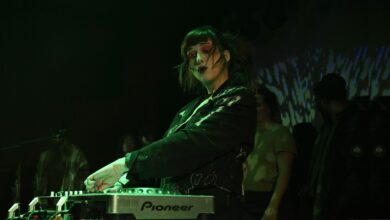‘Love’s Labour’s Lost’ is witty, musical, and moving
Love's Labour's Lost presents Shakespeare's classic in a modern and accessible way.
 Supplied: DBphotographics
Supplied: DBphotographicsLove’s Labour’s Lost, a classic Shakespeare romantic comedy, portrays the story of a king, two scholars, and their oath to ban themselves from a lot of things, and amongst those things is “women.” The story deals with the three of them feeling lost when they find themselves in love.
Edmund Stapleton, adaptor and director of the play, decided that he wanted to make a modern version of this story to help the audience truly understand what Shakespeare was trying to portray from this piece — what it is to love and what it is to live.
According to Stapleton, the cast of the play are eight actors from the graduating Bachelor of Fine Arts (BFA) acting program and two actors from the community — Chris Cook and Oscar Derkx. He hopes that Cook and Derkx “act as mentors [so] the students” learn and understand what it’s like to be a professional outside of university.
Stapleton’s adaption and translation of Love’s Labour’s Lost had a unique, modern, and very relatable touch to it. He says his modern retelling is used to increase accessibility for viewers from various backgrounds.
“I wanted to make it more accessible to an audience today,” Stapleton said. “People can feel they come here and don’t feel like, ‘I have to [have] already read the play’ or ‘I have to have been [an] English scholar or be in theatre to come see it. [It’s] for everyone, so it’s not just for those scholars who already know what the [piece is] about so it’s a fresh translation using the language of today, but keeping it as poetry.”
This contemporary version of the play featured costumes from modern fashion, from the ladies wearing pants to heeled boot to the various coloured suits worn by the male characters of the play, which would have never been seen in Shakespeare’s time.
Personally, my favourite part of the play would be the live music. Neil Diamond, Stevie Wonder, and multiple other artists had their music featured in the production.
The cast was definitely exceptionally talented in terms of portraying the emotions of the characters that they were playing, but also the aspect of song and dance they brought into the play. The show had various instruments on stage, from electric guitars to a bazooka, and even a saxophone. I very much enjoyed the jazz aspect they showcased.
The chemistry between Berowne (Jordan Harvey) and Rosaline (Abby McDougall) and even that of Boyet (Oscar Derkx) and Rosaline was very well portrayed. Scenes between Boyet and Rosaline made it very evident that Boyet was in love with Rosaline. Boyet showcased his anger and frustration by soiling the plans of the King, Berown, and Longaville to impress the ladies. Quick-witted Berowne figures out Boyet entirely and they fight, and no, they don’t duel — instead, they have a fistfight!
A trio that I enjoyed watching was Armado (Chris Cook), Moth (Shaughnessy O’Brien), and Hickory (Colin Bluekens). Their jokes and just how well they got along were very entertaining. Their little fights, chases, and arguments were one of the comic reliefs of the show.
Speaking of the comic — Dull (Emily Thorne), Holofernes (Dean Stockdale), and Nathaniel (Ben Kuchera) also entertained the crowd. These three characters had a battle of intellect which was a game of chess. Dull is underestimated by Holofernes in the game of chess and in the end, Holofernes’s distraction to help the King with the Princess of France (Emma Ryan) causes Dull to seemingly checkmate the Holofernes’s King.
The Princess of France is very well portrayed as a figure of maturity with a love for pulling pranks on King of Navarre. I enjoyed watching her and Boyet scheme ways in which they get to embarrass the king and his fellow friends.
Finally, the ending of the play is a song, the entire cast came on to the stage with candles and a piano and sang “Circle” by Harry Chapin, getting the audience to join in the singing as well.
After the showing, Stapleton wants viewers to understand what it’s like to be human, as it’s “a theme… Shakespeare deals with [often].”
“First off I want the audience to have a great time,” Stapleton said. “I want them to take away… what it means to be fully human… I think that’s what the play is dealing with so I want the audience to leave the theatre understanding that in order to live a full life, they need to let go of how scary death can be.”
The show came to a subtle close ensuring that the audience remembers what it truly means to love and to live. Love’s Labour’s Lost is playing October 8 to 16 at the Timms Centre for the Arts.




